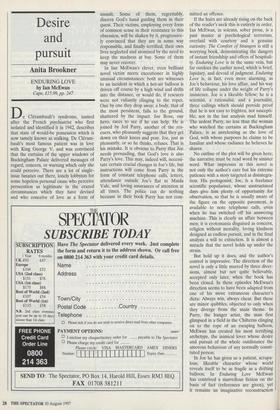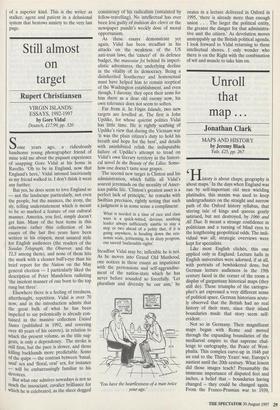Desire and pursuit
Anita Brookner
ENDURING LOVE by Ian McEwan Cape, £15.99, pp. 247 De Clerambault's syndrome, named after the French psychiatrist who first isolated and identified it in 1942, describes that state of would-be possession which is now tamely known as stalking. De Cleram- bault's most famous patient was in love with King George V, and was convinced that the curtains of the upper windows of Buckingham Palace delivered messages of regard, concern, or warning which only she could perceive. There are a lot of single- issue fanatics out there, lonely lobbyists for some hopeless personal cause who perceive persecution as legitimate in the crazed circumstances which they have devised and who conceive of love as a form of assault. Some of them, regrettably, discern God's hand guiding them in their quest. Their victims, employing every form of common sense in their resistance to this obsession, will be shaken by it, progressive- ly convinced that they are in some way responsible, and finally terrified, their own lives neglected and atomised by the need to keep the madness at bay. Some of them may never recover.
In Ian McEwan's clever, even brilliant novel victim meets executioner in highly unusual circumstances: both are witnesses to an incident in which a hot-air balloon is driven off course by a high wind and drifts into the distance, or would do, if rescuers were not valiantly clinging to the ropes. One by one they drop away; a body, that of the most persistent, falls to the ground, shattered by the impact. Joe Rose, our hero, races to see if he can help. He is joined by Jed Parry, another of the res- cuers, who pleasantly suggests that they get down on their knees and pray. Joe, just as pleasantly, or so he thinks, refuses. That is his mistake. It is obvious to Parry that Joe needs persuading, that God's love is also Parry's love. This may, indeed will, necessi- tate certain crucial changes in Joe's life, but instructions will come from Parry in the form of constant telephone calls, letters, attendance outside Joe's flat in Maida Vale, and loving assurances of attention at all times. The police can do nothing because in their book Parry has not corn- mitted an offence.
If the hairs are already rising on the back of the reader's neck this is entirely in order. Ian McEwan, in solemn, sober prose, is a past master at psychological terrorism, overlaid with courtesy and a genuine curiosity. The Comfort of Strangers is still a worrying book, demonstrating the dangers of instant friendship and offers of hospitali- ty. Enduring Love is in the same vein, but far outdoes the earlier novel, which is brief, lapidary, and devoid of judgment. Enduring Love is, in fact, even more alarming, as Joe's behaviour, his love affair, and his way of life collapse under the weight of Parry's insistence. Joe is a likeable fellow; he is a scientist, a rationalist, and a journalist, three callings which should provide proof that he is not easy to frighten, not suscepti- ble, not in the last analysis mad himself. The ardent Parry, no less than the woman who watched the curtains at Buckingham Palace, is as unrelenting as the love of God, with whose purposes he claims to be familiar and whose radiance he believes he shares.
No outline of the plot will be given here; the narrative must be read word by sinister word. What impresses in this novel is not only the author's care but his extreme patience with a story targeted at disintegra- tion. His protagonist, Joe, is a freelance scientific populariser, whose unstructured days give him plenty of opportunity for observation, so that he is usually aware of the figure on the opposite pavement, is available to note telephone calls, even when he has switched off his answering machine. This is clearly an affair between men; it is erotomania disguised as concern, religion without morality, loving kindness designed as endless pursuit, and in the final analysis a will to extinction. It is almost a miracle that the novel holds up under the strain.
But hold up it does, and the author's control is impressive. The direction of the novel is only a little marred by three diver- sions, almost but not quite believable, accepted only later, when the book has been closed. In these episodes McEwan's direction seems to have been adapted from one of his more extraneous character's dicta: Always win, always cheat. But these are minor quibbles, objected to only when they diverge from the main theme. In Parry, the hunger artist, the man first glimpsed in a field in the Chilterns clinging on to the rope of an escaping balloon, McEwan has created his most terrifying archetype, the inimical lover whose desire and pursuit of the whole outdistance the amorous behaviour of any normally consti- tuted person.
In Joe he has given us a patient, scrupu- lous, likeable character whose world reveals itself to be as fragile as a drifting balloon. In Enduring Love McEwan has contrived a marvellous fiction on the basis of fact (references are given), yet it remains an imaginative reconstruction of a superior kind. This is the writer as stalker, agent and patient in a delusional system that bestows anxiety to the very last page.



















































 Previous page
Previous page